Most Popular
Out of the Shadows
-
1
A defense attorney's perspective on Korea's real drug challenges
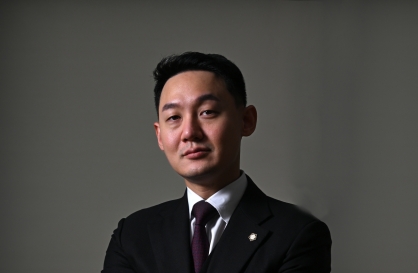
-
2
Body heat scanners help hunt for drugs at airport
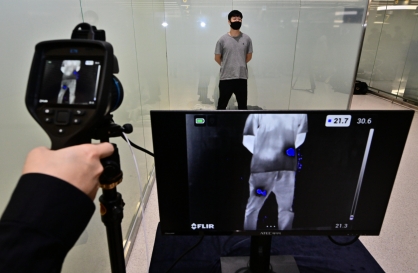
-
3
Enemy within: Illegal drug cases rare but rising in barracks
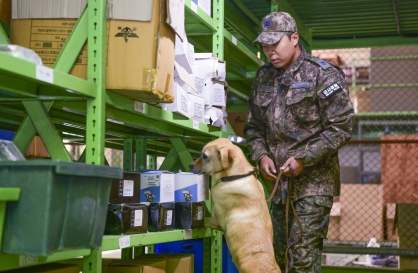
-
4
Surviving drug addiction: Peers from Korea, Japan share their stories

-
5
Tell the truth: Advanced drug education needed to curb teen exposure, experts say

[Out of the Shadows] Enemy within: Illegal drug cases rare but rising in barracks
Sniffer dogs deployed as military mail used as smuggling route; rising drug cases could undermine combat readiness, experts say
By Park Jun-heePublished : Dec. 12, 2023 - 15:35
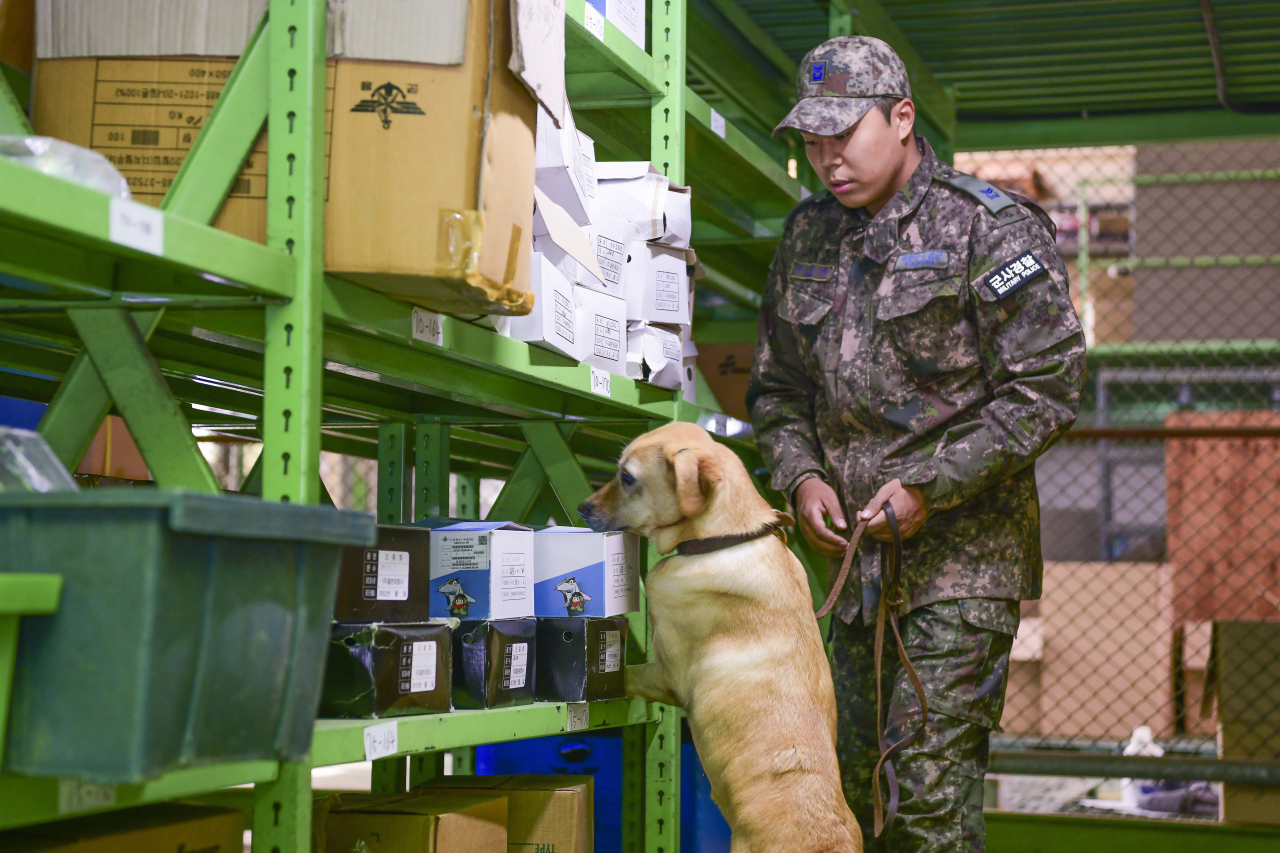
The South Korean Air Force announced on Dec. 3 that it had enlisted two dogs -- Dindin and Tank -- to detect the smuggling of drugs into the military. It was the first case of the military deploying and nurturing its own dogs not to detect enemy soliders, but illegal drug activities at the barracks.
Bringing the detection dogs in is just a part of measures devised to prevent the use of illegal substances at all levels of command, as the military has been dealing with the rise of illegal drug activities in recent years.
In April, six soldiers stationed in a division in Yeoncheon, Gyeonggi Province, were caught sneaking cannabis into the garrison through a parcel and smoking the banned substance inside the military base. The soldiers reportedly smoked cannabis in the Army’s enclosed shower booths during the early morning to avoid being caught. Of them, two soldiers had continuously purchased drugs from last September and even sold them to other soldiers.
In September, an Army private stationed in Gangwon Province was arrested and referred to military prosecution for using methamphetamine, commonly called “philopon” in South Korea, at his residence while on vacation.
Other data submitted to Rep. Song Ok-joo of the main opposition Democratic Party of Korea by the Army, Navy, Air Force and Marine Corps on drug-related crime statistics in the military from 2018 to August this year showed that military police booked a total of 118 military personnel.
Of them, 101 were from the Army; 12 were from the Navy and the Marines; and five were from the Air Force. By year, 10 were booked in 2018, 21 in 2019, nine in 2020, 20 in 2021 and 33 in 2022.
Experts pointed out that loopholes in parcel services which allow drug smuggling, as well as the failure to control soldiers put the military in jeopardy. They also say that these loopholes could lead to a decline in the warfighting capability of a unit or significant portion of the force in a country that is technically still at war with the North.
Addressing that drugs have never hit the military this hard, Yoon Heung-hee, a professor at Hansung University’s drug and alcohol addiction department, said a growing number of young soldiers are becoming “more astute” in sneaking drugs by disguising them as packages identical to other parcels to avoid the authorities’ radar.
While most soldiers have little interaction with the public, it doesn’t mean that the military is drug-free, Yoon told The Korea Herald.
“The drug trade happens in the outside world, like social media, which is how (soldiers) bring in illegal substances to the garrison,” Yoon noted, adding that the Army needs new measures to plug loopholes that allow service members to exploit the shipping service for drug transactions.
Under the current military regulations, active duty conscripts must open their parcels and go over their products with a senior military official when bringing packages into the military base.
Despite strict regulations, the military mail service is becoming a new drug route, which Yoon believes is due to the military’s lack of attentiveness in tracking packages. He said that the preventive measures fall short, adding that the armed forces lack disciplinary action and strict punishment for drug offenses.
A sergeant first class in the Army was caught purchasing birth control pills containing methamphetamine in March 2019, but was handed a suspended prosecution disposition from the military prosecutor’s office.
In another case, another noncommissioned officer was caught purchasing an aphrodisiac containing methamphetamine but was not indicted, as the military concluded that he had bought the product to “improve his marital relationship” and “strengthen his marriage.”
Yoon, a former police officer who worked in narcotics for over 30 years, pointed out that eased restrictions for soldiers also contributed to straight-laced service members turning to drugs, calling it an “unfortunate situation” posing a direct threat to national defense.
“Compared to the past, they can use phones now, where illicit sales and distribution of drugs like cannabis, meth, ketamine and cocaine take place, as well as leave their barracks more often for vacation. That is when they get exposed to drugs,” he said.
A single instance of drug use is one too many and could lead to addiction, the professor noted, suggesting that the military should conduct hair and urine tests for soldiers upon arrival from vacation.
Drugs are smoothly reaching customers in barracks and are becoming an emerging smuggling route because the Army has lost its management abilities, according to Huh Chang-deog, a sociology professor at Yeungnam University.
Huh pointed out that active duty personnel’s lack of awareness about military commitment and their insincere attitude toward the service gives them the audacity to “do the illegal.”
“(Once they enlist), their bodies begin to break down physically, and stress starts to take a toll. But the military isn’t able to take care of their men, so there’s a possibility that they’re engaging in illegal drug use to deal with the stress of their profession,” he told The Korea Herald.
Huh noted that young soldiers are getting more disconnected from each other as they put individualism ahead of the common good, failing to help or report their peers who are abusing drugs.
“For example, before, older generations scolded under-aged children if they were caught smoking. But the military isn’t able to do that, allowing soldiers to run the risk of bringing in drugs and even offering them to others,” the professor said.
“We’re stuck in a dire situation, now that drugs have occupied the military and substance abuse is on the verge of becoming rife (among soldiers), which could dismantle (Korea’s) combat readiness and cohesion,” Huh added. He also pointed out that the military should also take measures against substance abuse among active military personnel through thorough drug prevention education.
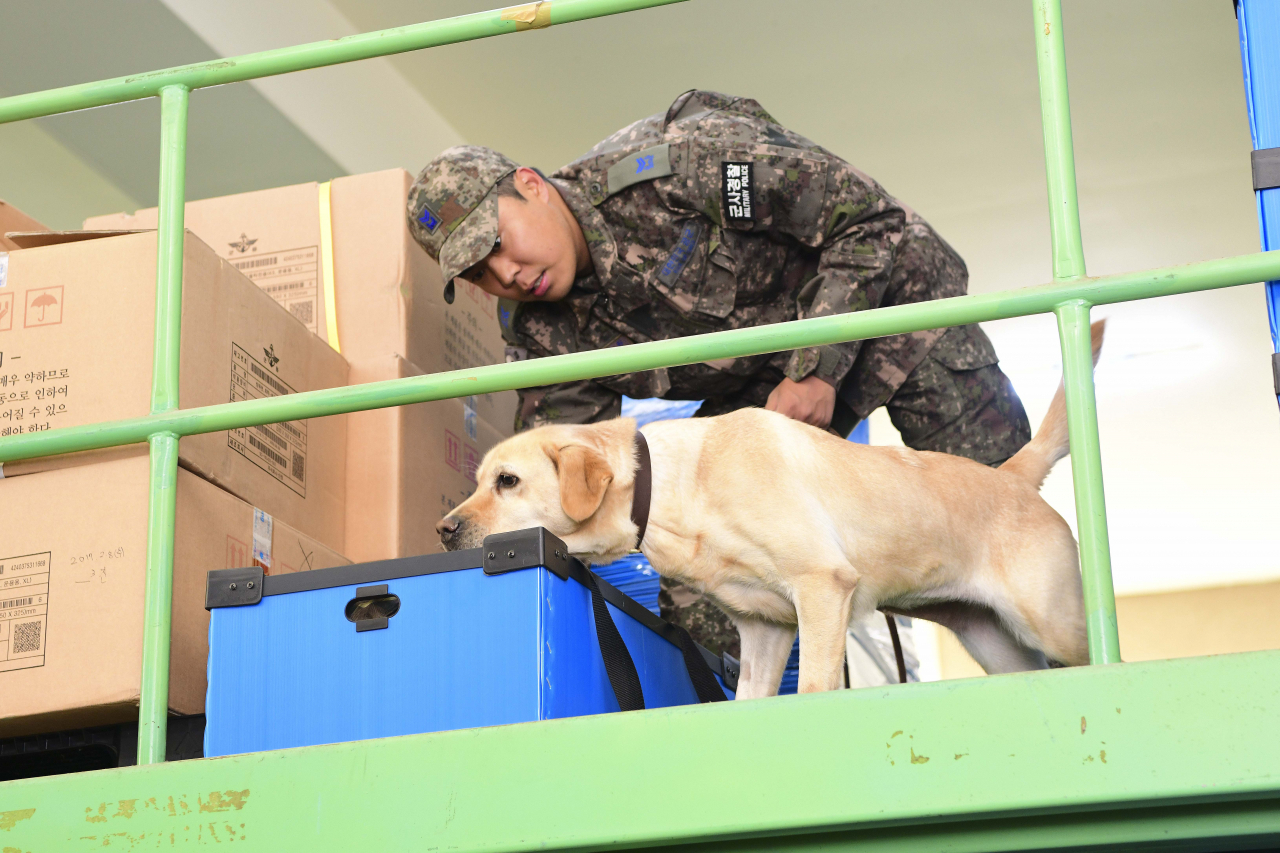
Battle against drugs
Rep. Song Kap-seok of the main opposition Democratic Party said the types of drugs they were caught for were cannabis, psychotropic medication such as meth or ecstasy, cocaine and opium.
Rep. Song expressed concerns that the rise in military drug crimes is threatening enlisted personnel members’ health and well-being. He urged the military to come up with a comprehensive drug prevention scheme, such as having every soldier undergo a drug test at least once annually to reduce risks.
Rep. Ki Dong-min of the Democratic Party and a member of the National Assembly’s National Defense Committee called for punitive punishment of drug-related crimes in the military. He explained that poor discipline could cause fatal accidents within a military base, where weapons like ammunition and firearms are being used.
While approved medical use of cannabis in Korea was legalized in 2019, possessing or using cannabis recreationally has been prohibited since 1976. The maximum sentence for use or possession is five years in prison or a fine of up to 50 million won ($38,000). But recent government data showed that military personnel didn’t face severe punishment based on their wrongdoings.
A report on how the Army has handled drug offenses over the past five years submitted to Rep. Ki found 13 drug-related crimes. Of the total, only five cases were subject to disciplinary action.
To create a drug-free military culture, the Defense Ministry announced in May that it would implement mandatory drug testing for all prospective and current enlistees and military officials.
The military also said that it would strengthen the inspection of incoming items, such as parcels and packages, to block the entry of drugs and related substances into military bases and detect products disguised as narcotics, including jellies, candy and gum.
In addition, it said it would prop up the management of medical narcotics to prevent the misuse of prescription drugs.
The Korea Herald is running a series of feature stories and interviews on the evolution and rise of drug crimes, insufficient support systems and young addicts’ stories in South Korea. This is the ninth installment. -- Ed.











![[Kim So-hyun] The quiet taxi driver from Paris](http://res.heraldm.com/phpwas/restmb_idxmake.php?idx=644&simg=/content/image/2024/04/25/20240425050891_0.jpg&u=)












